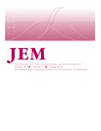
JOURNAL OF EDUCATIONAL MEASUREMENT
Scope & Guideline
Exploring New Frontiers in Educational Measurement
Introduction
Aims and Scopes
- Psychometrics and Measurement Theory:
The journal emphasizes psychometric principles, exploring various models like Item Response Theory (IRT) and Diagnostic Classification Models to ensure reliable and valid assessments. - Innovative Assessment Methodologies:
It focuses on new methodologies for educational measurement, including adaptive testing, automated scoring systems, and the integration of AI and machine learning in assessment practices. - Validity and Reliability of Assessments:
A key area of interest is the validity and reliability of educational assessments, including discussions on argument-based validity and score comparability across different contexts. - Data Analysis Techniques:
The journal promotes advanced data analysis techniques for interpreting educational measurement data, including Bayesian methods, multilevel modeling, and response time analysis. - Equity in Assessment:
The journal addresses issues of fairness and equity in assessments, investigating differential item functioning (DIF) and the impact of cultural and demographic factors on test performance.
Trending and Emerging
- Automated and AI-Based Scoring Systems:
There is a growing interest in the development and validation of automated scoring systems, particularly those leveraging artificial intelligence, to enhance the efficiency and reliability of assessments. - Multimodal and Process Data Analysis:
Emerging methodologies that analyze multimodal data, including process data from digital assessments and the integration of eye-tracking and response time metrics, are becoming more prominent. - Differential Item Functioning (DIF) and Fairness:
Research on DIF remains a critical area of focus, with increasing attention to ensuring fairness in assessments across diverse populations, particularly in the context of high-stakes testing. - Cognitive Diagnostic Models (CDMs):
There is an upward trend in the application of cognitive diagnostic models to better understand student learning and to provide more nuanced feedback about their skills and knowledge. - Integration of Educational Technology in Assessment:
The journal highlights themes surrounding the integration of technology in educational assessments, focusing on how digital tools can enhance measurement accuracy and engagement.
Declining or Waning
- Traditional Measurement Models:
There has been a noticeable decline in publications focused solely on classical test theory (CTT) methods, as more researchers are gravitating towards modern approaches like IRT and Bayesian methods. - Generalized Linear Models (GLM):
The specific application of generalized linear models for educational assessments is less frequently discussed, with a shift towards more complex modeling techniques that incorporate multiple dimensions and covariates. - Item Analysis Techniques:
The focus on basic item analysis methods appears to be waning, as researchers increasingly explore sophisticated analyses involving response time and cognitive processes. - Standardized Testing Practices:
Research on traditional standardized testing practices is becoming less common, likely due to growing critiques and calls for more innovative and adaptive assessment strategies.
Similar Journals
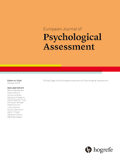
EUROPEAN JOURNAL OF PSYCHOLOGICAL ASSESSMENT
Innovating Assessment Techniques for Tomorrow's PsychologyWelcome to the European Journal of Psychological Assessment, a prestigious publication in the field of applied psychology, published by Hogrefe Publishing Corp. With a strong emphasis on advancing the methods and practices of psychological assessment, this journal has established itself as a crucial resource for researchers, practitioners, and students alike. Since its inception in 1996, it has built a reputation for quality and innovation, reflected by its impressive Q1 ranking in the applied psychology category, signifying its critical role in shaping the future of the discipline. The journal's impactful contributions – ranked #62 out of 249 within its field and indexed in Scopus at the 75th percentile – make it an essential reading for anyone interested in the latest assessment techniques and research findings. Although not an open-access journal, it continues to reach audiences through institutional subscriptions and provides a wealth of knowledge aimed at enhancing psychological practice and research.

Survey Research Methods
Elevating Standards in Educational Research PracticesSurvey Research Methods, published by the European Survey Research Association, serves as a pivotal open access journal dedicated to the field of survey methodology and research techniques since its inception in 2007. With an ISSN of 1864-3361, this journal has firmly established itself as a leader within the domain of educational research, reflected in its impressive Q1 ranking in the 2023 Education category and its position in the top 7% of the Scopus Social Sciences - Education rankings. Operating out of the United Kingdom with a significant address in Duisburg, Germany, the journal encourages the dissemination of innovative methodologies and results, fostering collaboration among researchers, practitioners, and students alike. Its commitment to open access ensures that valuable research is readily available to a global audience, empowering the advancement of knowledge in survey research. The journal’s objectives focus on enhancing the quality of survey data collection, improving data analysis techniques, and addressing challenges faced in the field, making it indispensable for anyone involved in educational research and beyond.
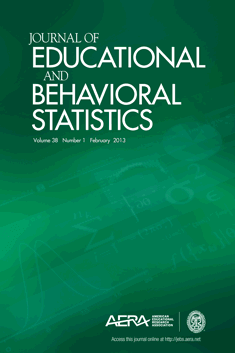
JOURNAL OF EDUCATIONAL AND BEHAVIORAL STATISTICS
Exploring New Horizons in Behavioral ResearchJOURNAL OF EDUCATIONAL AND BEHAVIORAL STATISTICS, published by SAGE Publications Inc, stands as a pivotal resource in the domains of education and social sciences. With an impressive impact factor reflecting its influence, it is categorized in the esteemed Q1 quartile for both Education and Social Sciences (miscellaneous), positioning it among the top-tier journals in these fields. The journal, bearing the ISSN 1076-9986 and E-ISSN 1935-1054, prides itself on disseminating rigorous research and innovative methodologies applicable to educational and behavioral statistics. Since its inception in 1996, it has continually evolved, featuring cutting-edge studies that address contemporary challenges in educational assessment and statistical techniques. Researchers, educators, and students alike will find invaluable insights within its pages, making it an essential publication for those seeking to advance their understanding and application of statistical methods in education. The journal's commitment to excellence and relevance ensures it remains a cornerstone for scholarly discourse through 2024 and beyond.
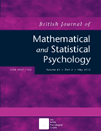
BRITISH JOURNAL OF MATHEMATICAL & STATISTICAL PSYCHOLOGY
Bridging Psychology, Mathematics, and Statistics for a Deeper UnderstandingThe British Journal of Mathematical & Statistical Psychology, published by Wiley, is a prestigious peer-reviewed journal that plays a pivotal role in advancing the interdisciplinary fields of psychology, mathematics, and statistics. With an ISSN of 0007-1102 and an E-ISSN of 2044-8317, it boasts a Category Quartile ranking of Q1 in diverse areas including Arts and Humanities, Medicine, Psychology, and Statistics and Probability as of 2023, signifying its considerable impact and relevance. This journal provides a platform for the dissemination of high-quality research and innovative methodological advancements that address complex psychological phenomena through rigorous statistical frameworks. It covers a breadth of topics from classic problems to modern data analytic techniques, appealing to researchers, professionals, and students alike. Founded in 1965, the journal continues to thrive global scholarly dialogue until 2024, fostering collaboration among disciplines and enhancing understanding of psychological data. Although it is not an open access journal, its rigorous selection process ensures that only the most significant and impactful research is published, further maintaining its esteemed position within the academic community.

International Journal of Assessment Tools in Education
Innovating Tools for Effective Educational EvaluationInternational Journal of Assessment Tools in Education is a pioneering scholarly publication dedicated to advancing the field of educational assessment through innovative tools and methodologies. Published by IZZET KARA and based out of the esteemed Pamukkale University in Turkey, this journal is committed to fostering academic discourse among researchers, educators, and policy makers. With an ISSN of 2148-7456, it aims to bridge the gap between assessment theory and practical application, ensuring that the latest insights in educational measurement can be readily accessed by professionals in the field. The journal promotes open access to its articles, enhancing visibility and facilitating the dissemination of knowledge. By publishing rigorous empirical studies, theoretical discussions, and practical reports, it plays an essential role in shaping best practices in educational assessment, making it an invaluable resource for anyone invested in improving educational outcomes.

Journal of Measurements in Engineering
Innovating Measurement Techniques for Engineering ExcellenceJournal of Measurements in Engineering is a pioneering open access journal dedicated to the crucial intersection of engineering and measurement technologies, published by JVE INT LTD in Lithuania. Since its transition to open access in 2018, the journal has significantly contributed to the field by providing a platform for disseminating innovative research findings and advances. With a focus on instrumentation, materials science, and mechanical engineering, it has established itself as a valuable resource for researchers, professionals, and students alike, offering insights that bridge theoretical concepts with practical applications. While currently holding a Q4 ranking in Instrumentation and Q3 ranks in both Materials Science (miscellaneous) and Mechanical Engineering, the journal encourages submissions that challenge existing paradigms and extend the boundaries of conventional measurements. As part of its commitment to fostering open scholarly communication, the journal accepts contributions reflecting a wide range of measurement methodologies and engineering applications up to the year 2024. By engaging with a global audience of practitioners and academics, the Journal of Measurements in Engineering underscores the vitality of precise measurement techniques in advancing engineering disciplines.

PSYCHOMETRIKA
Advancing psychometric principles for a deeper understanding.PSYCHOMETRIKA, an esteemed journal published by Springer, serves as a premier platform for advancing the field of psychometrics and quantitative psychology. Since its inception in 1936, the journal has maintained its commitment to disseminating high-quality research, making significant contributions to both applied mathematics and psychology, reflected in its distinguished Q1 ranking in relevant categories as of 2023. With an impressive Scopus ranking, positioned at #117 in Applied Mathematics and #62 in General Psychology, it occupies a critical niche for scholars aiming to explore the interplay between statistical methods and psychological measurement. Although not open access, PSYCHOMETRIKA provides a rigorous peer-reviewed environment that fosters innovative research, methodologies, and theories while offering valuable insights relevant to researchers, professionals, and students alike. Prepared to bridge theoretical knowledge with practical application, this journal is a vital resource for those looking to deepen their understanding of psychometric principles and advance their scholarly endeavors in the behavioral sciences.
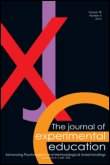
JOURNAL OF EXPERIMENTAL EDUCATION
Pioneering insights for a brighter educational future.Journal of Experimental Education, published by Routledge Journals, Taylor & Francis Ltd, is a prestigious platform dedicated to advancing the field of educational research. With an impressive history spanning from 1932 to 2024, this journal covers significant developments in Developmental and Educational Psychology and Education, achieving a Q1 ranking in both categories for 2023. The journal is recognized for its rigorous peer-reviewed articles that explore innovative experimental methodologies and empirical studies that shape contemporary practices in education. Current Scopus rankings further establish its credibility, placing it in the top percentiles among its peers. While it is not an open-access journal, the insights offered through its publications are invaluable for researchers, educators, and students seeking to deepen their understanding of educational phenomena and improve pedagogical approaches. By fostering a community dedicated to research excellence, the Journal of Experimental Education serves as an essential resource for those committed to the advancement of education.

Quantitative Methods for Psychology
Fostering Collaboration Through Open-Access ResearchQuantitative Methods for Psychology, with ISSN 1913-4126 and E-ISSN 2292-1354, is a premier open-access journal published by the University of Montreal, Department of Psychology. Since its inception in 2005, this journal has served as a vital resource for the dissemination of cutting-edge research and methodological advancements in psychological science. With a focus on quantitative approaches, it welcomes submissions that explore innovative statistical techniques, data analysis methodologies, and empirical studies that enhance understanding in psychology. The journal’s commitment to accessibility ensures that researchers, practitioners, and students alike can benefit from the wealth of knowledge it offers, fostering collaboration and advancing the field. As an integral platform for sharing significant findings and best practices, Quantitative Methods for Psychology is positioned to make substantial contributions to the landscape of psychological research.
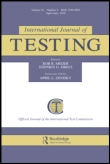
International Journal of Testing
Elevating Academic Discourse in Testing PracticesThe International Journal of Testing, published by Routledge Journals, Taylor & Francis Ltd, stands as a pivotal source of knowledge in the realms of education, modeling and simulation, and social psychology. With an ISSN of 1530-5058 and an E-ISSN of 1532-7574, this esteemed journal is recognized for its commitment to advancing the understanding of testing methodologies and their applications across diverse fields. Currently classified in the Q1 category for both Education and Modeling and Simulation, and Q2 for Social Psychology, it maintains a significant impact, ranking 434th among 1543 journals in Educational Social Sciences. The journal fosters high-quality research discussions, providing a platform for researchers, professionals, and students to share innovative insights and findings. Although it is not open access, the journal ensures that groundbreaking studies are disseminated widely to contribute to ongoing academic discourse until 2024 and beyond. With its headquarters in the United Kingdom at 2-4 Park Square, Milton Park, Abingdon OX14 4RN, Oxon, England, the International Journal of Testing continues to be an invaluable resource for anyone involved in testing theory and practice.